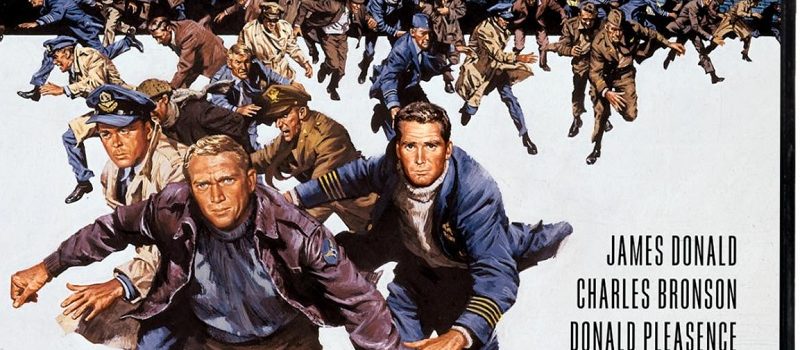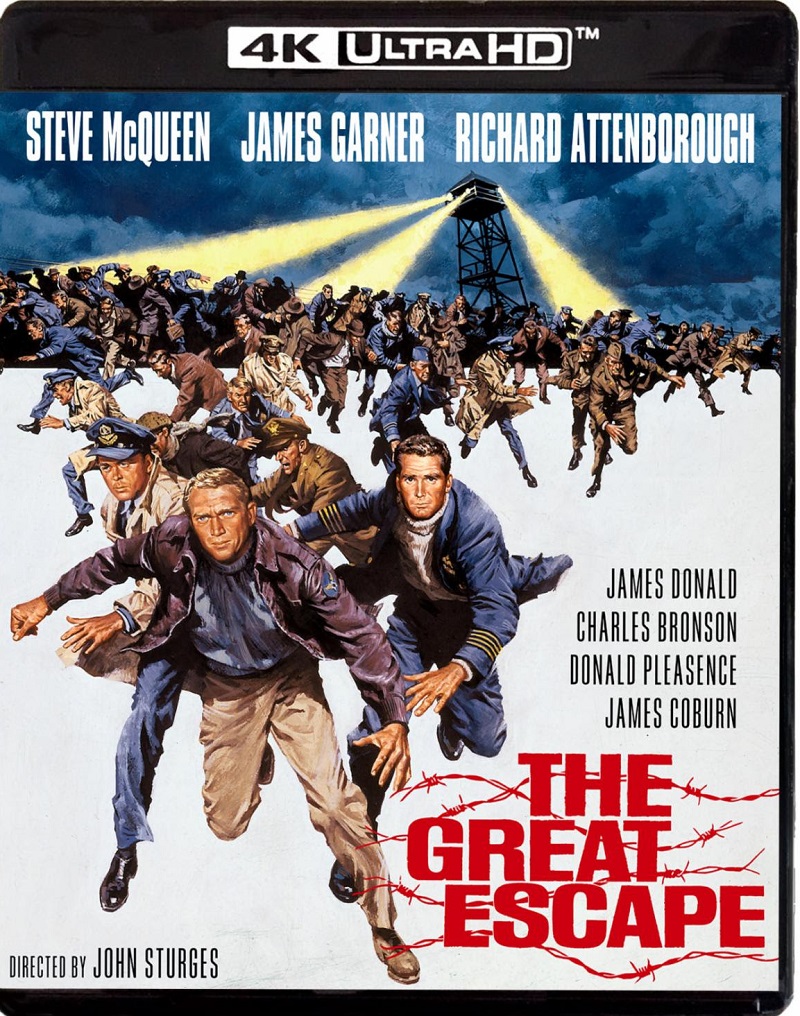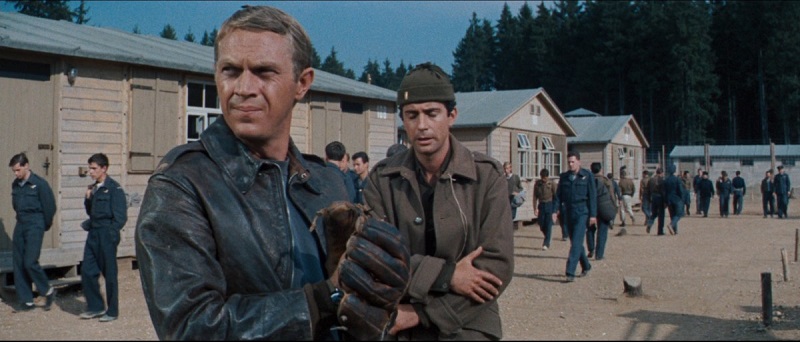After recently revisiting The Great Escape for a movie club started with friends from college during the pandemic, it seemed like a case of great minds think alike when I read that Kino Lorber was giving the Steve McQueen starring, John Sturges’ directed World War II prisoner camp escape a hi-def makeover. After experiencing the Blu-ray version, I was eager to dive into what KL had cooked up with their 4K Ultra HD upgrade.
Toss in the fact that the world had been “re-introduced” to The Great Escape via Generation X’s resident film expert, Quentin Tarantino, in his Oscar-winning stroke of genius that is Once Upon a Time… in Hollywood. In QT’s flick, it was put forth that Leonardo DiCaprio’s character was up for the role that went to McQueen and the auteur even went so far to film scenes where it appeared that DiCaprio was in The Great Escape instead of the Bullitt star.
It was all adding up to the sense that an iconic film was poised for a rightful celebration of its excellence. After experiencing the Kino Lorber 4K Ultra HD upgrade of The Great Escape, I can safely say that they have done an incredible job with the transfer, but also solidified the film’s spot in the landscape of film history. Not only does the upgrade look and sound fantastic, but now the film is preserved in the highest quality sonic and visual sense for future generations to discover until the end of time.
1963’s The Great Escape finds McQueen as a member of a group of Allied Prisoner of Wars (POWs) who undertook one of the most audacious and largest, in scope, escapes in history. It is considered one of the most imaginative and thrilling cinematic rides of all time.
World War II is at a fever pitch and the Allies, and the Axis are battling while utilizing everything they have to turn the tide of the expensive—financially and lives lost—war that had continued for years. One of the means for tipping the scales for your side is how you handle POWs as the key is to keep them off the battlefield, thus giving yourself an edge (one hopes). So, the Germans opened Stalag Luft III, considered the most secure, air-tight maximum security POW camp. It was designed and built with the most cunning of escape artists in mind and as the film commences, that is how many of the Allied troops are introduced—i.e., by how many times they have previously escaped other POW camps.
By sending all the great prison escapees to the same camp, the Nazis have unwillingly done something extraordinary that will tip the scale of the European theater of the war, only not in a manner they were hoping for. The Germans had gathered the greatest group of prison escape artists the continent had ever seen. So, how long before a plot is hatched for these guys to escape the un-escapable?
The superb Bartlett (Richard Attenborough, Jurassic Park) leads the team, the handy Hendley (James Garner, The Rockford Files), and supremely dedicated Hilts (McQueen). Filling out the sublime cast are Charles Bronson, James Coburn, Donald Pleasence (The Exorcist), James Donald (The Bridge on the River Kwai), and David McCallum (Mosquito Squadron). The film was a huge hit and even went on to secure a nod in 1964 from the Oscars for Best Film Editing and scored a Best Motion Picture—Drama nomination from the Golden Globes.
The Great Escape was helmed by Sturges, himself a veteran of World War II. One thing that is surprising, given that fact, is how there is tension throughout, but not much in the way of battlefield sequences. Sturges preferred to focus on the chemistry between the men and the rich, dialogue-heavy script by James Clavell and W.R. Burnett. It is a gamble, but it pays off majorly in that that emotive connection is wisely earned between audience and ensemble that has everyone beyond pulling for these guys to escape their sadistic captors. It also allows the director to spend more screen time detailing the intricacy of the escape, earning the film’s moniker. Digging tunnels and developing a plan that will succeed, all without tipping their hats as to what they are plotting.
By the time the titular action occurs, it is as if Sturges has dragged the viewer into the camp. We are vested in the escape and that personalization factor also has contributed to why the film shows no signs of abating from public consciousness, even as decades have passed.
When it comes to the image and sound upgrade, Kino Lorber has truly outdone themselves. The image is less bright than a certain beloved company’s 4K upgrade from last year. That works immensely, given the drab conditions of the prisoner camp and the hell that these men are enduring at the hands of the Nazis. Green isn’t the greatest color for the screen when high-end upgrades occur. But Kino gets the hue impeccably correct and that is simply the tip of the awesomeness iceberg of this entire transfer.
The Great Escape has never looked (or sounded) so blissfully spot-on in its lauded history.
The Kino Lorber upgrade includes not one, but two superb commentary tracks. The first is hosted by Steven Jay Rubin, the author behind Combat Films: American Realism and features insight from Coburn, Garner, Pleasance, and others—not to mention some magnificent quotes from Sturges from a 1974 interview. The second, and more recently recorded, is hosted by noted film historian Steve Michell and as such delves smartly into the history and making-of elements of The Great Escape.
The second disc features over two hours of bonus features. You’re going to want to dive right into the 25-minute The Real Virgil Hilts: A Man Called Jones. It’s narrated by the velvety tones of Coburn and centers on David Jones, a U.S. Army Air Corps flight jockey who we learn was the model for McQueen’s legendary character. Then, there’s the stunning documentary The Great Escape: The Untold Story. It’s a little-known doc that hopefully, thanks to Kino Lorber, will get the attention it deserves. The insight into the real-life mass escape in 1944 served as the inspiration for the 4K upgraded The Great Escape.
Filling out the bonus features on the Kino Lorber 4K upgrade are a series of interviews with cast and crew, a classic trailer, and four fascinating TV documentary shorts from 2001 that was narrated by legend Burt Reynolds.
Film Grade: A
Bonus Features: A



